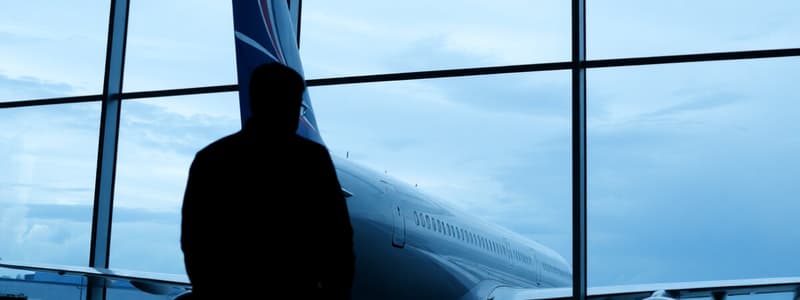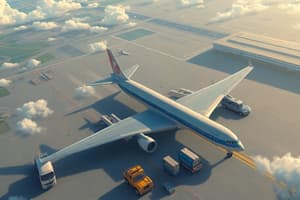Podcast
Questions and Answers
What is a primary responsibility of area control in air traffic management?
What is a primary responsibility of area control in air traffic management?
- Ensuring adequate separation of aircraft in controlled airspace (correct)
- Emergency landing procedures near the airport
- Providing clearance to aircraft on the ground
- Handling emergency situations during a flight
Which facility is essential for giving clearance to an aircraft landing at or taking off from an airport?
Which facility is essential for giving clearance to an aircraft landing at or taking off from an airport?
- Approach control facility
- Air Traffic Control Operations room
- Area control center
- Aerodrome control tower (correct)
What is the role of approach control in air traffic management?
What is the role of approach control in air traffic management?
- Providing radio instructions to air traffic within the approach area (correct)
- Controlling aircraft once they have departed the airport airspace
- Directing emergency landings and evacuations
- Managing takeoff sequences on the runway
Which statement is true regarding the physical location of an airport control tower?
Which statement is true regarding the physical location of an airport control tower?
Which of the following services is typically found on the airside of an airport?
Which of the following services is typically found on the airside of an airport?
What does the airside of an airport primarily accommodate?
What does the airside of an airport primarily accommodate?
Which of the following is NOT considered a facility found on the airside of an airport?
Which of the following is NOT considered a facility found on the airside of an airport?
When planning runways, what design criterion is crucial to ensure safe aircraft operations?
When planning runways, what design criterion is crucial to ensure safe aircraft operations?
What is the role of airspace around an airport?
What is the role of airspace around an airport?
Which component is included in the airside facilities to enhance safe aircraft operation?
Which component is included in the airside facilities to enhance safe aircraft operation?
Airside components are designed primarily to facilitate which kind of vehicle movement?
Airside components are designed primarily to facilitate which kind of vehicle movement?
Which of the following statements about runway markings is true?
Which of the following statements about runway markings is true?
What characteristic is crucial for the design of runways concerning aircraft performance?
What characteristic is crucial for the design of runways concerning aircraft performance?
What is the primary function of the runway centerline marking?
What is the primary function of the runway centerline marking?
What color background with black lettering denotes direction signs at an airport?
What color background with black lettering denotes direction signs at an airport?
Which lighting color indicates the beginning of a runway?
Which lighting color indicates the beginning of a runway?
What type of signs must pilots follow at an entrance to a runway or critical area?
What type of signs must pilots follow at an entrance to a runway or critical area?
What information do touchdown zone markings provide to pilots?
What information do touchdown zone markings provide to pilots?
Which sign indicates an area where aircraft are not permitted to enter?
Which sign indicates an area where aircraft are not permitted to enter?
What is the color of location signs that indicate a taxiway or runway location?
What is the color of location signs that indicate a taxiway or runway location?
What type of lights are used to mark the edges of taxiways at airports?
What type of lights are used to mark the edges of taxiways at airports?
Flashcards
Airside Components
Airside Components
Facilities on an airport's property for aircraft operations, including runways, taxiways, parking areas, and navigation aids.
Airspace
Airspace
The area above an airport where aircraft move after takeoff, before landing, or in transit.
Runway Design
Runway Design
Specific guidelines for runway length, width, direction, configuration, slope, and pavement thickness for safety and efficiency.
Runway Markings
Runway Markings
Signup and view all the flashcards
Airfield Signage
Airfield Signage
Signup and view all the flashcards
Runway Lengths/Widths
Runway Lengths/Widths
Signup and view all the flashcards
Airport Lighting
Airport Lighting
Signup and view all the flashcards
Airfield Facilities
Airfield Facilities
Signup and view all the flashcards
Landside Components
Landside Components
Signup and view all the flashcards
Terminal Component
Terminal Component
Signup and view all the flashcards
Airport Lighting System
Airport Lighting System
Signup and view all the flashcards
Air Traffic Control (ATC)
Air Traffic Control (ATC)
Signup and view all the flashcards
Area Control
Area Control
Signup and view all the flashcards
Approach Control
Approach Control
Signup and view all the flashcards
Aerodrome Control
Aerodrome Control
Signup and view all the flashcards
Automated People Mover (APM)
Automated People Mover (APM)
Signup and view all the flashcards
Fuel facilities
Fuel facilities
Signup and view all the flashcards
Airport Police
Airport Police
Signup and view all the flashcards
Ambulance and medical services
Ambulance and medical services
Signup and view all the flashcards
ICAO Standards
ICAO Standards
Signup and view all the flashcards
Runway Centerline Marking
Runway Centerline Marking
Signup and view all the flashcards
Runway Aiming Point Marking
Runway Aiming Point Marking
Signup and view all the flashcards
Runway Touchdown Zone Markers
Runway Touchdown Zone Markers
Signup and view all the flashcards
Airport Signage
Airport Signage
Signup and view all the flashcards
Direction Signs
Direction Signs
Signup and view all the flashcards
Location Signs
Location Signs
Signup and view all the flashcards
Mandatory Instruction Signs
Mandatory Instruction Signs
Signup and view all the flashcards
Airport Lighting System
Airport Lighting System
Signup and view all the flashcards
Rotating Beacon Lights
Rotating Beacon Lights
Signup and view all the flashcards
Threshold Lights (Green)
Threshold Lights (Green)
Signup and view all the flashcards
End-of-Runway Lights (Red)
End-of-Runway Lights (Red)
Signup and view all the flashcards
Taxiway Lights (Blue)
Taxiway Lights (Blue)
Signup and view all the flashcards
PAPI Systems (2/4 light)
PAPI Systems (2/4 light)
Signup and view all the flashcards
Study Notes
Airport Operations Management: Airside (Part One)
- Airport Components: Airport airside is designed and managed to accommodate aircraft movement, both to and from the airport, and in the surrounding airspace
- Airside Components: These include all facilities located on the airport property that support aircraft operations
- Airspace: The area surrounding the airport where aircraft may maneuver before takeoff, after landing, or in transit to another airport
- Landside Components: These manage the movement of ground vehicles, passengers, and cargo.
- Airport Terminal Component: Facilitates passenger and baggage movement from the landside to the aircraft airside.
- Ground Access Component: Manages the movement of ground-based vehicles between the surrounding area and airport buildings
- Airfield Components: Runways, taxiways, aircraft parking, navigational aids, lighting, signage, markings (all designed to support safe aircraft operation).
- Facilities: Snow plowing, deicing stations, fuel facilities
- Runways: Strict design guidelines needed for length, width, orientation, configuration, slope and pavement thickness.
- Runway Markings: Centerline markings (highlight runway center) , aiming point markings (visual guidance) and touchdown zone markers (distance information) are crucial
- Runways Lengths and Widths: Planned for acceleration during takeoff and deceleration after landing.
- ICAO Standards: Lighting, markings, signage, and procedures must comply with International Civil Aviation Organization (ICAO) requirements
- Airfield Signage: Crucial for safe operation, guiding pilots to correct locations and avoiding restricted areas (direction signs, location signs, mandatory instruction signs).
- Airport Lighting System: Standardized to provide direction and identification for all air and ground crews. Lighting helps differentiate runways and taxiways at night.
- Green threshold lights: Used to identify runway edges
- Red Lights: Used to identify runway obstructions and ends
- Blue Lights: Used to highlight taxiway edges
- PAPI: (Pilot's Approach Path Indicator) is a pilot visual aid when landing
- Other Facilities and Services in Airside: Airport Radar, Marshalling Signals, Stairs, Air/Sky Bridges, Automated People Mover (APM), Transporter, Fuel facilities, Air Traffic Control Tower
- Air Traffic Control Areas: Airport air traffic control is split into Area Control (separation of aircraft), Approach control (directions prelanding/post-departure), and Aerodrome control (giving clearances when aircraft are landing or taking off).
- Fire and Rescue Services: Essential for emergencies
- Airport Police: Security at the airport
- Ambulance and Medical Services: Handling medical emergencies
- Review Questions: Examples of airside facilities and services, number of runways at Hong Kong International Airport, and runway dimensions of Hong Kong International Airport.
Studying That Suits You
Use AI to generate personalized quizzes and flashcards to suit your learning preferences.



